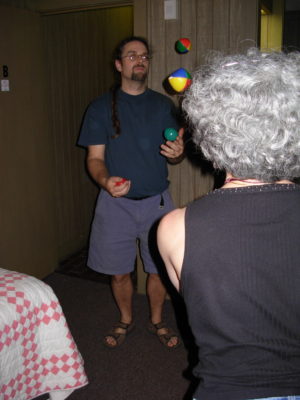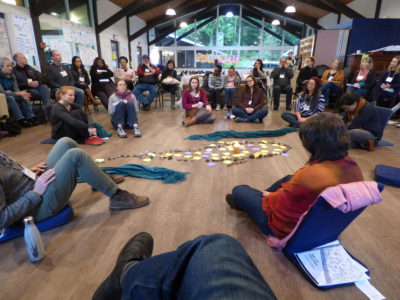
It’s Psych 101 material to learn about projection. The act of overlaying personal inner thought (attribution, motive, sense-making, fear, accusation, etc.) to another person’s behavior or thought. That person must be butting in line because he wants to get ahead of the others. Surely, right? Oops, it turns out that he was meeting his aging mother in the line and he was returning from parking the car so that she wouldn’t have to walk far. Oh, umm, right.
Projection is a concept you can learn in five minutes, but then you deepen that learning and awareness for a lifetime. A bit like juggling. My friend Chris (that’s him above from eight years ago) has demonstrated a few times teaching someone to juggle in such a short time. But you know there is no ceiling on how much more refined and complicated your juggling can become. So it is with projection also. It’s not whether you project that is the question for most of us. It’s how much and how aware can we become of the nuancing of our projections. That’s not 101. It’s likely not 505 either. That’s wizard school.
In a recent aha of learning my own projections (which, in a way, I wanted to deny), I stumbled into them through personal journalling. I was writing in the most honest way that I could, my assessment of someone that I’m close to but have been really feeling frustrated about. I wrote down a bunch of stuff. My story. My perceptions. “She doesn’t appreciate me.” “She is not committed.” “She is abandoning our work together.” “She is distracted by other things.”
It could be that what I wrote was true. In some way, I’m sure it all was. But my writing wasn’t for the purpose of completely clarifying that truth. It wasn’t about reduction. Some things, regardless of our great efforts, are meant to remain at least, some part, mystery.
My writing didn’t stop there. With each of the statements, the inner thoughts that I was overlaying on this person, I challenged myself to turn the projection onto me. It doesn’t mean that the first assessments weren’t right. It just means that there is more territory that is helpful to explore. Caitlin Frost is one of my key teachers in this area — her work with Byron Katie is brilliant and very thoughtful. Is there a part of ME that doesn’t appreciate her (the one I was writing about)? Is there a part of ME that is not committed? Is there a part of ME that is abandoning or wants to abandon our work together? Is there a part of ME that is distracted by too many other things?
The answers to these questions for me were clear. Of course, there was a part of me that was all of that. Not “maybe.” Not, “well, I’d have to stretch really hard to find it.” It was obvious. Duh! Yes.
Now, I’m not sure everybody goes to that layer of truth telling in public or in private journalling. It takes a unique ability to be in the multiplicity of views, seeing and owning partial truth in all of the complexity. It definitely takes more than a yes / no orientation. Binary doesn’t work in projection work (though, in truth, I recognize there is a part of me that would be comforted by such binary simplicity).
So, aha. There was some important clarity for me. And not reformed from malice. Oops, it turns out there is a part of me that can relate to wanting to cut to the front of the line. There is also a part of me that relates to wanting to take care of the aging people in my life. And there is a part of me that relates to feeling a bit embarrassed, but still going for it, hoping others will understand when I go right to the front of the line.
Can you see the kicker in this? For me, any of the projections that I so conveniently blanket on to others, are already in me. All of them. Not just the flattering things. But just some of the ugly, bitchy things. This doesn’t mean I’m always any of those things. I’m not always an ass. But if I’m honest, I can relate to being an ass, or even wanting to be sometimes.
The gift of projection is that it creates gateway to seeing more of our interiors — this applies to groups seeing more of their interior also — and more of the internal, often impulse sense-making brains that we have. It’s impressive, right. In seeing those interiors, and in recognizing the “all of that is in me too” parts, ugly, shadowy projections can transform into massive gift of clarity and compassion.
From 101 to wizard school — projections.





